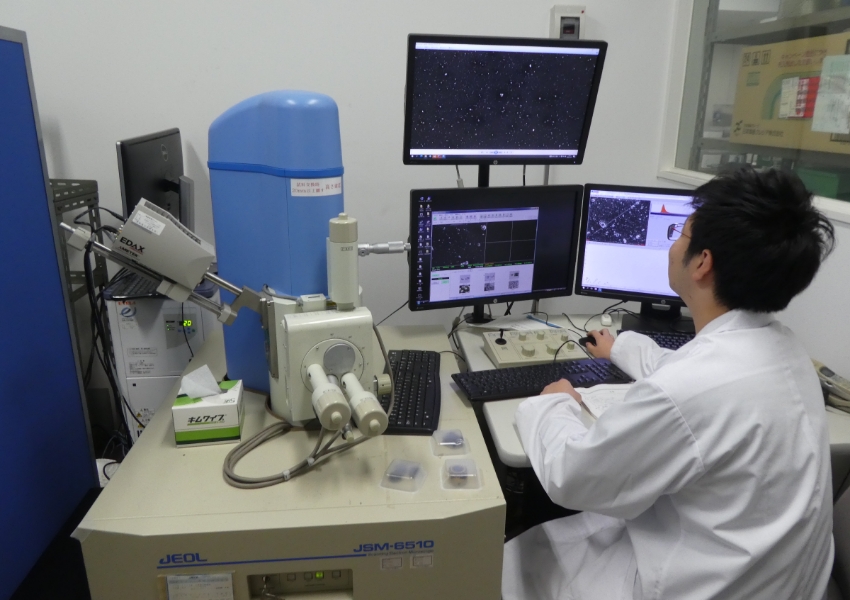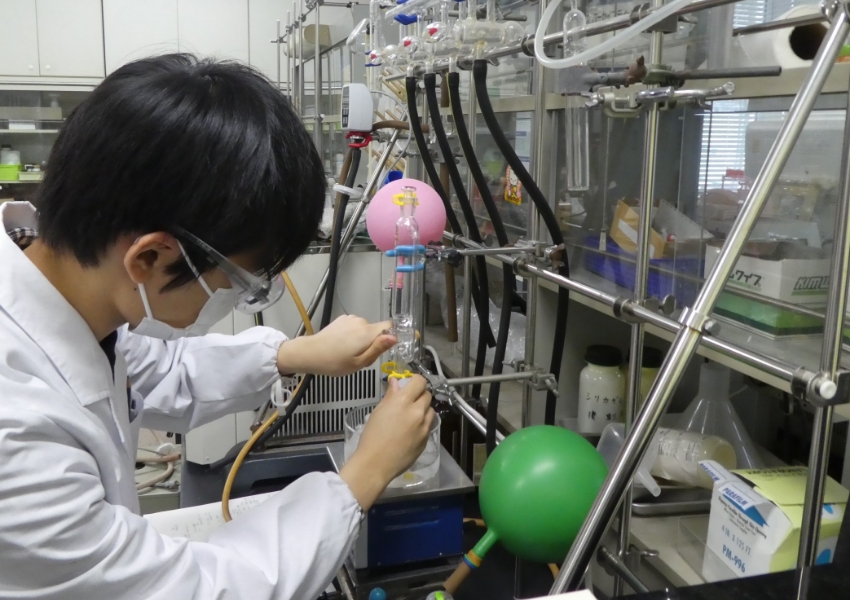About the Department of Applied Chemistry
In recent years, science and chemical technology have rapidly become more sophisticated and complex.
To address this situation, the Department of Applied Chemistry is taking a comprehensive academic approach to develop professionals with originality and problem solving skills.
The department offers four specialized fields: Physical Materials Chemistry, Inorganic Materials Chemistry, Environmental Chemical Engineering, and Organic Functional Chemistry.
The department conducts original and advanced research in various fields, including inorganic/organic materials, polymer materials, electronic materials, energy, global environmental conservation, and analysis, and cultivates graduates who will be useful to society.
Graduates of our department are very active in society in the fields of research, technology, and education.
Majors
Physical Materials Chemistry
In this field, education and research is conducted in solid state chemistry and analytical chemistry.
Specifically, in addition to research on thin-film growth, property control, and device applications of various compound semiconductors and other electronic materials, we are also engaged in research on the development of chemical materials based on biomass and their analytical chemical applications.
Inorganic Materials Chemistry
In this field, education and research is conducted in inorganic chemistry, complex chemistry, materials chemistry, and electrochemistry.
Research is conducted on the synthesis and properties (electrical and electronic properties, structural analysis, etc.) of a wide variety of inorganic functional materials, ranging from oxide clusters to electronic ceramics and bioceramics, and their applications (fuel cells, catalysts, etc.). Specifically, research areas include the fabrication and characterization of semiconductor and ferroelectric thin films by soft material synthesis, the development of environmentally benign electronic ceramics and solid electrolytes for fuel cells, and the synthesis and functional enhancement of functional metal oxide clusters.
Environmental Chemical Engineering
To achieve a carbon-neutral, decarbonized society, it is important to promote energy conservation and dramatically improve the conversion efficiency of existing energy sources, as well as to develop technologies to utilize new energy sources such as solar, wind, biomass, waste, and hydrogen. Specifically, research is conducted on the reduction of CO2 emissions by blending woody biomass and waste with coal in high proportions to reduce CO2 emissions, effective utilization of slag emitted from IGCC (Advanced Integrated Coal Gasification Combined Cycle) power generation systems, energy use of woody biomass, and hydrogen production and recovery technologies to reduce CO2 emissions.
Organic Functional Chemistry
In this field, research is conducted in the development of new functional organic molecules and organic functional materials formed by various organic compounds for application in organic materials and pharmaceuticals.
For example, in regards to functional organic molecules, we have been studying the design, development of synthetic methods, and elucidation of structures and properties of group 16 elements such as sulfur, selenium, and tellurium, as well as the rational design and synthesis of molecular catalysts and development of reactions using these catalysts.
In addition, regarding organic functional materials, we are working on the development of smart gels and chromic materials that respond to external stimuli by changing color and structure, the development of self-assembling materials such as gels and liquid crystals and the control of their micro- or nano-scale organization, and the precision synthesis of polymers, using environmentally harmonized processes. The research group is also involved in the precision synthesis of polymers by environmentally harmonized processes.
Education
Master’s Course
| Compulsory Courses | Research on Physical Materials Chemistry, Research on Inorganic Materials Chemistry, Research on Environmental Chemical Engineering, Research on Organic Functional Chemistry |
| Optional Courses | Advanced Solid Chemistry, Advanced Functional Materials, Advanced New Ceramics, Advanced Organic Material Chemistry, Advanced Materials Chemistry, Advanced Chemical Engineering, Advanced Chemical Reaction Engineering, Advanced Organic Reaction Mechanism, Research on Synthetic Organic Chemistry, Advanced Catalytic Chemical Processes |
| Common Courses | Introduction to Nano-Technology, Industrial Mathematics, Mathematical Engineering in Informational Science, Nuclear Power Technology, English for Engineers |
Doctoral Course
| Compulsory Courses | Research on Applied Chemistry |
| Common Courses | Advanced Frontier Engineering |
Distinctive efforts
Environmental Chemical Engineering Laboratory

The objective of our research is “Net-zero CO2 emissions in 2050.” For example, research on reducing clinker troubles to promote energy use of woody biomass such as cedar thinnings, research on development of new catalysts using materials informatics, and research on the construction of an innovative carbon cycle system have been conducted. In addition, we develop a new chemical structure analysis technique that combines image analysis using scanning electron microscope (SEM-EDS) and image processing using deep learning. By using this technique, we predict the shape of fly ash particles generated from the combustion process of coal and woody biomass and the behavior of ash adhesion to heat transfer tubes in boilers in detail.
Organic Structural Chemistry Laboratory

We synthesize new organic compounds that are expected to be used for pharmaceuticals, functional materials, and useful catalysts, and investigate their structures, reactions, and functions. For example, we synthesize new organic compounds by incorporating typical elements such as sulfur and selenium into nitrogen-containing heterocyclic structures such as indolizine, which is one of the aromatic heterocyclic compounds widely used in our daily lives in pharmaceuticals and electronic materials. These new organic compounds are expected to apply to anticancer agents, chemical sensors and so on. We develop new functionalities by revealing characteristic structures and reactivities derived from typical elements.

